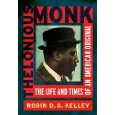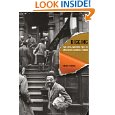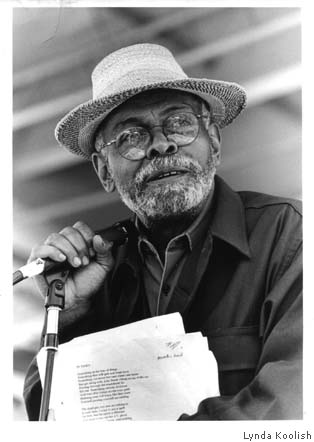Like most of the participants in our ongoing dialogue with African American music writers, Gregory Thomas, has both feet and hands in several camps. Greg’s byline has been featured in numerous publications, including Salon.com., Guardian Observer (London), American Legacy, Africana.com, BlackAmericaWeb.com, Daily News (NY, NY), TBWT.com, Callaloo and others. He was the founding editor-in-chief of Harlem World magazine.
Additionally Gregory Thomas has taught jazz education at the Brooklyn Academy of Music, the Thurgood Marshall Academy, and the Frederick Doublass Academy for the Jazz Museum in Harlem’s Harlem Speaks Education Initiative.
As an electronic journalist Greg details his web-television exploits below. He has hosted radio specials on WBAI (99.5 FM, Pacifica Radio in New York City), where he hosts a regular jazz show the first Monday each month from 9:00-11:00 p.m.

Writer-Producer-Broadcaster
Gregory Thomas
What motivated you to write about this music?
The foundation was the music my parents listened to which included jazz, and my deep study and enjoyment of the giants of jazz I’d been listening to very intently since high school. Inspired by a high school stage band concert, I began to play the alto sax at 15 years old. I took lessons with a local Staten Island legend, Caesar DiMauro; studied music theory and saxophone method books; played in various classical and jazz ensembles; tuned in regularly to WRVR and WBGO; and minored in music at Hamilton College, where I also hosted a jazz radio show for three years. Sharing a melody line with trumpet icon Clark Terry there, on April 17, 1984 in the college chapel, was an epiphany, a mystical experience of musical ecstasy.
A few years after graduating from Hamilton I met Keith Clinkscales and Leonard Burnett, later of Vibe and Savoy, who launched their first publication, Urban Profile, in the late ’80s. I was more troubled by how relatively few black folk attend live jazz performances than by the dearth of black writers about jazz. So Keith and Len published my very first professional piece: "Why Black Folks Should Listen to Jazz." I became a staff writer for the Brooklyn-based City Sun a few years later, and wrote about jazz and other subjects. Since then I’ve free-lanced for many publications.
My initial goals as a jazz journalist were to report accurately, and educate readers gently, while describing a recording or a concert so the reader felt that he or she had experienced it too. Usually if I don’t like a performance, live or on record, I just don’t write about it. I’m not into bashing artists to feed my ego or further my career. My major objective now is to share my knowledge and adoration of the music on as many platforms to as many people as possible — in print, on radio, on stage at the National Jazz Museum in Harlem, and on the internet and mobile through the TV series I host, Jazz It Up!
When you started covering the music were you aware of the dearth of African Americans writing about serious music?
Well it wasn’t as bad then as it seems to me now. I’d read pieces on jazz by Stanley Crouch and Greg Tate in the Village Voice, Gene Seymour in the Nation and New York Newsday, as well as jazz writings by Harlemite Herb Boyd, and a contemporary of mine, Eugene Holley, in various publications. Playthell Benjamin wrote about jazz (and a whole lot more) for the Voice and other periodicals. All of these guys were in New York in my early years as a writer, as were the ever-looming presence of the elder grand masters — Ralph Ellison and Albert Murray.
Why do you suppose that’s still such a glaring disparity — where you have a significant number of black musicians playing this music but so few black jazz media commentators?
I suppose that most black commentators who focus on music generally deal with more popular genres. And in 2009, there are less and less publications that even cover "serious music" anymore. The glaring disparity has to do with black musicians being acculturated early on to the cultural power and appeal of jazz expression, particularly since their ancestors founded and innovated the blues idom vernacular called jazz, versus black media commentators who privilege popular forms (and the career benefits that could bring) over jazz, a fine art that they may not even like or feel qualified to write about.
Pop and youth culture hold a powerful sway. You have to go deep in the woodshed to write about jazz with substance. Most black commentators, even those in the academy, apparently aren’t ready, willing or able to go that deep in the shed about the musical form at the very pinnacle of their culture, as developed in the United States. With some notable exceptions, this has been the case through the entire history of the music.
{Editor’s note: on that academy tip, one wonders if we will ever see the likes of such leading black scholar-intellectuals as Henry Louis Gates, Cornell West, or Michael Eric Dyson write extensively on the subject of jazz music, with the same degree of vigor with which at least West and Dyson have taken up the pen to wax rhapsodic on black pop. Still waitin’…]
But hey, on the other hand, perhaps writing about the fine arts, about "serious music," considering our difficult history in this land, was aptly viewed as a luxury until more recent times.
Do you think that disparity or dearth of African American writers contributes to how the music is covered?
Sure, but I think we can only take that point so far. Most writers covering jazz readily admit the black American roots of the music, so that’s a commonality. But there are different views on the value of certain styles or sub-genres, and so different emphases arise based on stylistic preferences. These and other factors such as those I detail later play an important role in how the music is covered as much or more than race.
As in politics, where race doesn’t necessarily determine whether one is, say, liberal or conservative, African-American writers won’t share the same opinions about the music based solely on their cultural identification. Anyway, white and other writers who don’t identify as "black" still share in the values and expressive content of black American culture by a sort of cultural osmosis, because that blues idiom is in the very fabric, the fiber, of American society and culture writ large. If you consider yourself American… you part black too!
Since you’ve been writing and broadcasting about serious music, have you ever found yourself questioning why some musicians may be elevated over others and is it your sense that has anything to do with the lack of cultural diversity among the writers covering this music?
Yes, I have at times questioned why some musicians may be elevated over others. And though the back story is usually more complicated than a simple "race" analysis, race being an omnipresent cancer in the body politic, does play a role. It’s important to note that race and cultural diversity are actually two different things — the confusion between race and culture has been deadly — but I think it better to confront race in jazz to best move beyond it. Race is ultimately trivial and stupid but to transcend it we must face the illusion/delusion of race squarely; this is especially true in the era of Obama.
Record label and public relations support factor in such elevations, as does a need for some writers to find the "next hot artist." So many good jazz artists labor in relative obscurity that when they get some attention, I usually don’t have a problem with it. Cultural diversity among writers will flower more perspectives, but not a consensus on which artists deserve to be elevated over others.
However, I don’t agree with certain musicians being called "jazz" artists when they themselves will say, for instance, that they play "instrumental R&B." The way the term "jazz" has been marketed is problematic too, especially by festival promoters and the radio industry (i.e. "smooth jazz"). They endeavor to profit from the veneer and sophisticated brand of jazz while pulling in other genres to make more money than they could with jazz proper. That’s business. Kenny G, for instance, is a popular pop/R&B instrumentalists, but when he is elevated by the mainstream press as a "jazz" artist due to record sales and radio play over, say, Kenny Garrett, the most influential jazz alto of his generation, that’s hype, not an accurate evaluation of genre or of artistic weight and authority.
Furthermore, I think there is an undercurrent of race in why artists such as Diana Krall, Chris Botti, and Norah Jones become popular performing a mellow, soothing, less-experimental style of music. They fill a niche in the music and radio industries and for certain market segments. But I don’t criticize those artists for that, it’s not their fault as individuals that the dumb idea of race is so entrenched that they benefit from white privilege as well as their musical style and talent as artists.
What’s your sense of the indifference of so many African American-oriented publications towards this music, despite the fact that so many African American artists continue to creat serious music?
Jazz is a fine art and most black publications focus on popular music. As Albert Murray says, the quality and range of aesthetic statement can be grouped into folk, pop, and fine art categories, for pedagogical purposes. Our celebrity and profit-driven society overall doesn’t value fine art based on intrinsic or long-term value. If it doesn’t have a big audience, then it won’t be considered relevant to most black publications because they compete in a media field where popularity and celebrity trumps all.
This is especially sad and tragic because elder masters such as Hank Jones, Roy Haynes, Clark Terry, Wayne Shorter, Sonny Rollins, Phil Woods, Barry Harris, Charles McPherson, Jimmy Heath, Reggie Workman, Louis Hayes, Jimmy Cobb, Ben Riley, Benny Golson, Buster Williams, Jon Hendricks, Melba Joyce, Gloria Lynne, Ahmad Jamal, and Grady Tate are still on the scene. I could easily name 20 more living legends unknown to a wider black audience, or to the general public. The audiences consuming black publications are aware of Quincy Jones and Herbie Hancock, and even Wynton Marsalis, but they usually aren’t hip to the just-mentioned senior giants. To re-phrase Carter G. Woodson, this is the mis-education of the black American. These artists should be revered and honored by black publications and media outlets as a cultural and ancestral imperative.
American Legacy magazine, for which I’ve written features on Ralph Ellison and Albert Murray, is one of the few African American periodicals I can point to that delves into the historical and cultural depths beyond pop culture and contemporary hype.
Oprah’s fame and world-wide celebrity is larger than just a black audience, so she could reach that demographic and more. I wrote an open letter to Oprah in All About Jazz inspiring her to have more jazz musicians on her show, not just as performers, but as commentators. Jazz musicians are some of the most worldly, sophisticated and smart people I know. Exposing wider audiences to jazz musicians as artists and as thinkers is one way to address the low cultural moment in which we find ourselves.
The public education system and the music industry are largely at fault for the current state of affairs, where a vicious cycle of mediocrity predominates.
It’s incumbent upon those of us who love and value this music’s contribution to this nation and the world to be more entrepreneurial. [The Independent Ear] is an exampole of this. My online jazz news and entertainment series Jazz It Up! is another.
How would you react to the contention that the way and tone of how serious music is covered has something to do with who is writing about it?
How serious music is covered is a matter of individual taste, depth of historical, aesthetic, literary and musical knowledge. native talent and disciplined application of all the above. These factors fluctuate, of course, among writers of varying backgrounds. How the music is covered also has to do with how the writer views his or her social and cultural function. I recently produced and moderated a panel discussion at the National Jazz Museum in Harlem that brought together jazz critics and scholars (Gary Giddins, Howard Mandel, John Gennari) and jazz musicians (Steve Coleman, Lewis Nash, Jon Gordon and Vijay Iyer) for a dialogue. I ventured a definition of the role of jazz criticism: to be a bridge between the artists, the art form and the public for the sake of publicity, education, and aesthetic evaluation. That’s how I see my role, so that orientation grounds the tone and approach I take when I write about the music.
In your experience writing about serious music what have been some of your most rewarding encounters?
Getting to meet, interview and even become friends with musicians who play the music that most moves my soul has been extremely rewarding. Of course hearing great music live that I otherwise may not have been able to afford is another. When a reader says to me "I felt like I was there," I say to myself: "mission accomplished"! There is also a community of academics and scholars with whom I’ve interacted as a member of the Jazz Study Group at Columbia University. I’m grateful to Robert O’Meally for asking me to join in 1999, as I worked towards a doctorate in American Studies at NYU. (I decided not to pursue academia as a career.)
Last, but far from least are friendships and mentor relationships I’ve nurtured over the years that have jazz, and an abiding appreciation of black American culture, at the root.
What obstacles have you run up against — besides difficult editors and indifferent publications — in your efforts at covering jazz?
The main obstacle, other than those you’ve mentioned, is making a living covering jazz. So, like many others, I’ve had to supplement coverage of jazz with other work to support my family. Another obstacle has been getting due recognition in the jazz press about Jazz it Up! Though we had a little coverage in Downbeat and JazzTimes when we launched in 2007, since then the coverage hasn’t been commensurate with what we’ve accomplished. Jazz it Up! is the only online TV series devoted to this music, and over the course of 18 half hour episodes we’ve garnered close to 3 million viewers online. That’s jazz news that warrants coverage.
Ironically, the organization that produces and presents the Emmy Awards has recognized Jazz it Up! in fall 2008, the National Academy of Recording Arts and Sciences nominated Jazz it Up! for a Global Media Award in the Long Form Entertainment category. Not one jazz publication — online or otherwise — covered this achievement.
If you were pressed to list several musicians who may be somewhat bubbling under the surface or just about to break through as far as wider spread public consciousness, why might they be and why?
Jonathan Batiste, a young pianist from New Orleans, is a charismatic, fresh voice on jazz piano. I’m also excited about pianist Gerald Clayton, who comes from a great family of musicians; his touch, taste and technique are superb. Dominick Farinacci and Theo Croker (Doc Cheatham’s grandson) are two young trumpeters who deserve wider recognition for their fidelity to the tradition while attempting to forge new pathways. Vibraphonist Warren Wolf plays jazz andd other genres of music with deep integrity and verve. He’s a favorite of Christian McBride, so that speaks for itself. Edmar Castaneda is an incredible harpist on the verge too; he plays the harp with a percussive virtuosity that is a wonder to hear and see.
What have been the most intriguing new records you’ve heard this year so far?
Benny Golson, New Time, New ‘Tet
Bobby Broom, Boby Broom Plays for Monk
Christian McBride & Inside Straight, Kind of Brown
Cyrus Chestnut, Spirit
Roy Hargrove Big Band, Emergence
Vijay Iyer, Historicity
Take 6, The Standard
You can check out Greg Thomas’ Jazz it Up! internet TV series and catch up with his latest exploits at www.jazzituptv.com.





